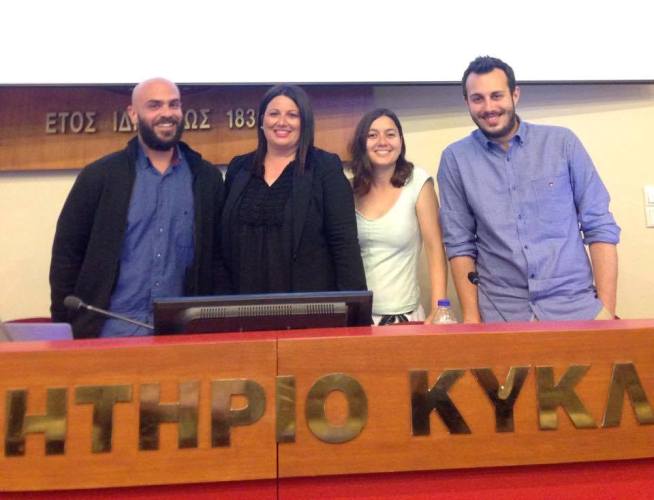by Marina Spanou
Translating Europe Forum took place for the third consecutive year in Brussels, on 28-29 October, under the auspices of the EU Commission’s Directorate General for Translation. Just like last year, one of the greatest advantages of this event was its truly European character; walking through the corridors and halls during the breaks one could hear languages and accents from all over this great continent of ours–giving the conference a distinctly European feel.
This year’s sessions focused on language technologies and machine translation, largely reflecting the predominant trend in our sector and providing the opportunity for researchers and universities to present their work (in our opinion, one of the strongest points of this edition).
Andrew Bredenkamp of Translators without Borders
The first day kicked off with the keynote speech by Andrew Bredenkamp, Chair of the Board at Translators without Borders, who spoke about the social significance of translation, outlining the ways in which volunteer translators can transmit invaluable information to the local populations of crisis-stricken regions and countries in a language that they can understand. One of the most tweeted phrases of his presentation was “More people die of lack of information than lack of medication”, which sums up his main points quite nicely. The conference continued with two consecutive roundtables on language technologies, where members of research institutes and universities and representatives of European Union bodies presented their latest research, as well as new portals and features with a linguistic component (such as the e-Justice portal and the Online Dispute Resolution platform).
After lunch, we followed the session on developments in Machine Translation, during which representatives of three research institutes (DFKI, University of Leeds and Fondazione Bruno Kessler) presented their research on this subject and TAUS presented their new system for translation quality assessment. After outlining some technical details regarding their MT systems, researchers pointed out that they want to hear more from translators regarding their tools and that the input of language professionals is instrumental in the development of high-quality translation software (both MT and CAT tools).
Aljoscha Burchardt (German Research Centre for Artificial Intelligence — DFKI)
Finally, we participated in the session on the human factor, where the interaction between translators and their tools was discussed in detail, finishing off with a very interesting speech by Andy Walker from University of Roehampton, rather provocatively entitled “How realistic is the idea that the translation profession is threatened by technology?”. In a quite entertaining and lively presentation, Dr. Walker explained that, according to research, the occupations that are most threatened by technology are routine, mid-skill jobs, as opposed to the high- and low-skill ones. This could potentially be seen as an opportunity for translators to specialize and acquire those high-level skills that are most difficult to automate. On a more positive note, according to estimates (which have been notoriously inaccurate in the past), machine translation is only expected to reach the level of human translation in 2075 (when, as Dr. Walker very aptly put it, most of us will be dead anyway!).
Day 2 – Opening session with Jost Zetsche
Day 2 started with an interview with Jost Zetsche (Twitter users may know him as @jeromobot), who pointed out the reluctance of translators to adopt new technologies and suggested that language professionals get more involved in the development of machine translation and CAT tools and provide their feedback to researchers. Another valuable point of his interview was that, as tools develop more and more, there should –and eventually will- be a shift towards charging per hour rather than per word in the translation industry.
Following that, representatives of the European institutions presented translation and terminology tools and initiatives which respond to their own needs (such as CAT4TRAD at the EU Parliament, MicroHint at the Council and CATE Lab at the DGT). During this session, we were very happy to hear that IATE is soon to be replaced by a modern, user-friendlier version. Finally, we followed the session on the impact of technologies on translators, where the discussion focused on research regarding MT acceptance, tools translators use for their work and potential room for improvement, as well as the impact of disruptive technologies on human translators (where we also learned the new term “biotranslators”).
Iulianna van der Lek-Ciudin presenting her research on how translators work in real life
To sum up, the predominant theme of the conference was undoubtedly machine translation and what it means for the translation industry. Are new technologies threatening our livelihood or are they just tools that can make our life easier? This question is a recurrent one, and judging from the multitude of tweets and questions posed during the conference along those lines, it’s not one that we will stop hearing anytime soon. Wherever one stands on this subject, once more it became obvious that translators should try to keep abreast with technological developments and have a say in the development of new tools, seeing as we are the ones that they are destined for.
As for Yourtranslator, this year, too, we thoroughly enjoyed participating in this conference and exchanging views with such a diverse and multinational group of language professionals —from EU representatives to translation students and from LSP representatives to academics. We believe that this mix creates opportunities for very fruitful discussions on the present and future of our sector and we are looking forward to an equally interesting event next year!
*The full programme with links to the video recordings and to all available presentations can be found here.











